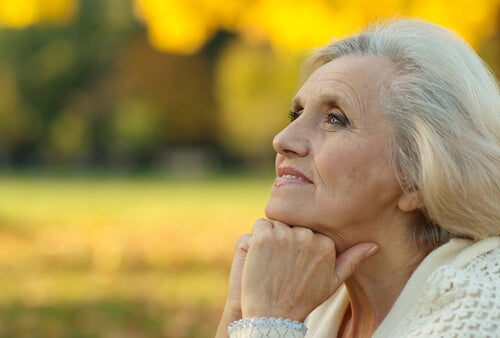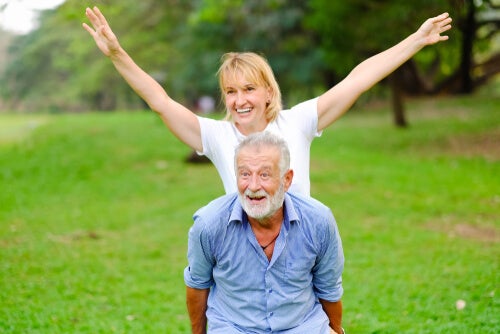Active Ageing - What Is it About?


Written and verified by the psychologist María Alejandra Castro Arbeláez
Each human being ages differently. In a context that recognizes the influence of culture, society, hereditary factors, or upbringing, the World Health Organization is emphasizing active ageing. But why is this?
Today, we’d like to tell you what aging is about and how it’s evolved throughout history. We’ll also talk about an interesting proposal that covers this idea.

The history of how people age
Aging has been conceived in a different way throughout history:
- Ancient Greece. In the Republic, Plato referred to old age as a positive stage. However, Aristotle said it was a stage of weakness and compassion in Rhetoric. In addition, he characterized older people as suspicious, fickle, selfish, and cynical.
- Cicero. He considered old age the stage of understanding and reason. In addition, he spoke of the importance of preparing for old age.
- Horacio. This man suggested that old age wasn’t a golden stage because it required more adaptations.
- Middle Ages. At this time, Saint Thomas Aquinas suggested that old age was synonymous with decadence.
- Renaissance. This era was characterized by an escape from death. Furthermore, during this time, older people were considered in decay. Some said the elderly were experts at tricks and witchcraft.
- 19th century. The first scientific investigations gave a twist to the conception of old age.
- 2oth century. After World War II, scientists noticed a larger population. After defeating various infectious diseases, thanks to the advancement of protocols and medical technology, life expectancy soared.
Aging in modern times
Currently, aging is a stage people don’t worry too much about beyond those who are caregivers and those who’ve reached this stage. There are a lot of older people in the Western world. Perhaps this is because society encourages people to try to stay young longer and so many deter it through all sorts of products, exercise, and surgeries, among other things.
In addition, there’s not much talk about death. In fact, it’s as if it were a matter that people just don’t want to acknowledge so they don’t talk about it. The same thing happens with aging. Also, in various countries, the elderly population is excluded and they mainly inhabit nursing homes. Most are separated from their family nucleus. In other words, society went from evaluating the experience of an older adult to underestimating it entirely. Most people don’t want to think they’ll reach this age someday.
However, it’s a different story in the East. In countries such as Japan, older adults are considered honorable, due to their many abilities and wisdom. Therefore, people treat them with respect and admiration.
Active ageing
Active ageing, according to the World Health Organization (WHO), consists of optimizing well-being on three levels:
- Physical. Consists of everything related to the physical body.
- Social. It consists of the interactions that people establish. For example, a toxic environment could result in a poor quality life.
- Mental. The affective and cognitive world.
The idea is to consider all of them. For what purpose? To expand everyone’s quality of life, productivity, and healthy life expectancy in old age.
This means that active ageing emphasizes health in an integral way. It takes into account all the stages that the individual goes through because prevention could help improve them.

Why is active ageing important?
It’s a vital matter since the idea is to provide human beings with multidimensional well-being in the ageing stage. For this, people would have to act from different sectors:
- Health. From the perspective of both assistance and prevention.
- Economical. So people who reach old age are also financially stable.
- Educational. For disease prevention and to keep the mind active.
- Professional. Some people think they can no longer work because they’re older.
However, there are several ways to do it. All you have to do is create a system you can adapt to. Actually, people could work in any area they want because old age is a comprehensive concept.
In addition to these, active ageing proposes changes in transportation, housing, and justice. Thus, you could have a more functional population integrated into society, valuing everything that it can provide you, and trying to meet its needs.
Active ageing is everyone’s business. It’s about collaborating from various sectors to improve the quality of life in this stage. You’ll get old regardless of how old you are right now. If everyone cooperates with each other, then active ageing will be a reality.
Each human being ages differently. In a context that recognizes the influence of culture, society, hereditary factors, or upbringing, the World Health Organization is emphasizing active ageing. But why is this?
Today, we’d like to tell you what aging is about and how it’s evolved throughout history. We’ll also talk about an interesting proposal that covers this idea.

The history of how people age
Aging has been conceived in a different way throughout history:
- Ancient Greece. In the Republic, Plato referred to old age as a positive stage. However, Aristotle said it was a stage of weakness and compassion in Rhetoric. In addition, he characterized older people as suspicious, fickle, selfish, and cynical.
- Cicero. He considered old age the stage of understanding and reason. In addition, he spoke of the importance of preparing for old age.
- Horacio. This man suggested that old age wasn’t a golden stage because it required more adaptations.
- Middle Ages. At this time, Saint Thomas Aquinas suggested that old age was synonymous with decadence.
- Renaissance. This era was characterized by an escape from death. Furthermore, during this time, older people were considered in decay. Some said the elderly were experts at tricks and witchcraft.
- 19th century. The first scientific investigations gave a twist to the conception of old age.
- 2oth century. After World War II, scientists noticed a larger population. After defeating various infectious diseases, thanks to the advancement of protocols and medical technology, life expectancy soared.
Aging in modern times
Currently, aging is a stage people don’t worry too much about beyond those who are caregivers and those who’ve reached this stage. There are a lot of older people in the Western world. Perhaps this is because society encourages people to try to stay young longer and so many deter it through all sorts of products, exercise, and surgeries, among other things.
In addition, there’s not much talk about death. In fact, it’s as if it were a matter that people just don’t want to acknowledge so they don’t talk about it. The same thing happens with aging. Also, in various countries, the elderly population is excluded and they mainly inhabit nursing homes. Most are separated from their family nucleus. In other words, society went from evaluating the experience of an older adult to underestimating it entirely. Most people don’t want to think they’ll reach this age someday.
However, it’s a different story in the East. In countries such as Japan, older adults are considered honorable, due to their many abilities and wisdom. Therefore, people treat them with respect and admiration.
Active ageing
Active ageing, according to the World Health Organization (WHO), consists of optimizing well-being on three levels:
- Physical. Consists of everything related to the physical body.
- Social. It consists of the interactions that people establish. For example, a toxic environment could result in a poor quality life.
- Mental. The affective and cognitive world.
The idea is to consider all of them. For what purpose? To expand everyone’s quality of life, productivity, and healthy life expectancy in old age.
This means that active ageing emphasizes health in an integral way. It takes into account all the stages that the individual goes through because prevention could help improve them.

Why is active ageing important?
It’s a vital matter since the idea is to provide human beings with multidimensional well-being in the ageing stage. For this, people would have to act from different sectors:
- Health. From the perspective of both assistance and prevention.
- Economical. So people who reach old age are also financially stable.
- Educational. For disease prevention and to keep the mind active.
- Professional. Some people think they can no longer work because they’re older.
However, there are several ways to do it. All you have to do is create a system you can adapt to. Actually, people could work in any area they want because old age is a comprehensive concept.
In addition to these, active ageing proposes changes in transportation, housing, and justice. Thus, you could have a more functional population integrated into society, valuing everything that it can provide you, and trying to meet its needs.
Active ageing is everyone’s business. It’s about collaborating from various sectors to improve the quality of life in this stage. You’ll get old regardless of how old you are right now. If everyone cooperates with each other, then active ageing will be a reality.
All cited sources were thoroughly reviewed by our team to ensure their quality, reliability, currency, and validity. The bibliography of this article was considered reliable and of academic or scientific accuracy.
Kalache, A., Plouffe, L. / Voelcker, I. (2015). Envejecimiento Activo. Un marco político ante la revolución de la longevidad.
Organización Mundial de la Salud. (2015)Informe mundial sobre el envejecimiento. Recuperado de: www.who.int
This text is provided for informational purposes only and does not replace consultation with a professional. If in doubt, consult your specialist.







